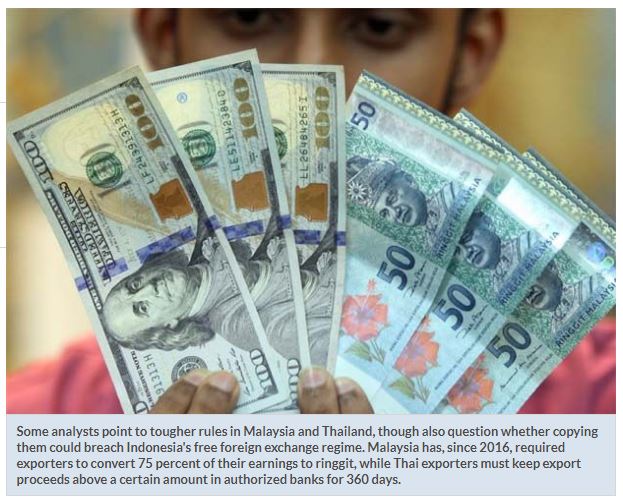Indonesia aims to coax, not compel, exporters to convert dollar
JAKARTA: Indonesia’s finance minister said the government aims to “persuade” exporters to keep earnings onshore and convert them into rupiah, rather than make this mandatory, amid confusion over a plan floated this week to support the ailing currency.
On Tuesday, Trade Minister Enggartiasto Lukita had said authorities would make it mandatory for exporters of commodities such as palm oil, coal, oil and natural gas to keep half of their proceeds onshore for at least six months and convert them to rupiah.
Asked about Lukita’s remarks, Finance Minister Sri Mulyani Indrawati told reporters on Thursday: “I am hoping earnings can be saved onshore and converted to rupiah.”
She said authorities had talked to some companies holding dollars to “persuade” them to convert to rupiah, including mining companies who she said paid contractors with dollars.
The Trade Ministry this week also revised a regulation on natural resource shipments, requiring exports to use letters of credit issued by banks in Indonesia and tightening rules on implementation.
The moves are the latest in a string of measures by President Joko Widodo’s government to support the rupiah, which has been hit with portfolio outflows and rising imports, and is near its weakest in 20 years.
Other measures announced in recent weeks include increasing Indonesia’s coal output by 100 million tonnes, import tariffs, delays to an estimated $24 billion in energy projects and enforcing biodiesel use.
Exporter industry groups say the measures will hurt their business, and criticise the plans lack of clarity.
‘PRESSURE ON CASHFLOWS’
Indonesia is the world’s biggest exporter of thermal coal and palm oil, with shipments last year worth around $39 billion combined , and a major global supplier of crude oil, natural gas, minerals, coffee and cocoa.
Pandu Sjahrir, Indonesian Coal Mining Association (ICMA) chairman, said discussions had been held with the finance ministry over the export earnings proposals.
He urged the government to provide incentives “rather than banning things” to support the rupiah. “Everybody is being reactive to it, trying to work out how to proceed,” he said.
Ido Hutabarat, chairman of the Indonesia Mining Association (IMA), said retaining and converting export revenue would put pressure on cashflows of exporters, especially those repaying offshore debt and buying imported equipment that’s mostly paid for in dollars.
Togar Sitanggang, deputy chairman of the Indonesia Palm Oil Association (GAPKI), said the moves could lead some producers to reduce exports and sell as much as they can domestically to avoid having to deposit 50 percent of their revenue.
FREE FOREIGN EXCHANGE?
Faced with a rupiah that has lost around 9 percent of its value against the dollar this year, President Widodo has repeatedly urged exporters to exchange dollar earnings.
Some analysts point to tougher rules in Malaysia and Thailand, though also question whether copying them could breach Indonesia’s free foreign exchange regime.
Malaysia has, since 2016, required exporters to convert 75 percent of their earnings to ringgit, while Thai exporters must keep export proceeds above a certain amount in authorized banks for 360 days.
Bank Mandiri chief economist Anton Gunawan said the government and central bank could provide incentives to encourage rupiah conversion, such as cutting tax rates on foreign currency term deposits for exporters. – Reuters
Source: https://www.thestar.com.my/business/business-news/2018/09/21/indonesia-aims-to-coax-not-compel-exporters-to-convert-dollar/#OsPiG9O17HlkWqcw.99


 English
English




